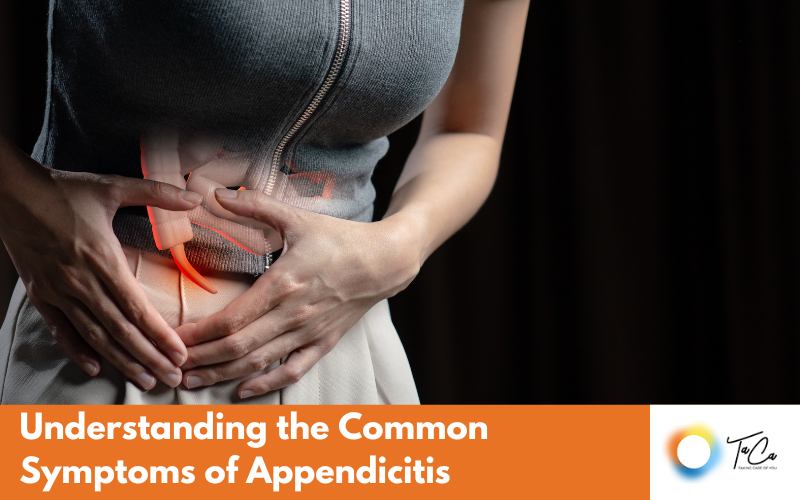Appendicitis is a medical condition that occurs when the appendix becomes inflamed and swollen. It is essentially good to be aware of the common symptoms of appendicitis promptly, as a delay in diagnosis and treatment often lead to complications. In this article, we will discuss the typical symptoms associated with appendicitis, enabling individuals to seek timely medical attention and ensure proper appendicitis treatment and surgery in India.
Common Symptoms of Appendicitis are as follows:
- Abdominal Pain: One of the primary symptoms of appendicitis is abdominal pain. Initially, the pain may manifest around the navel, before gradually shifting to the lower right side of the abdomen. The pain typically intensifies over a few hours and becomes constant and sharp. It may worsen with movement, coughing, or deep breathing. Individuals experience tenderness or discomfort upon applying pressure to the affected area.
- Loss of Appetite and Nausea: Appendicitis often causes loss of appetite, accompanied by feelings of nausea and sometimes vomiting. The nausea can become persistent or intermittent, and contribute to the loss of interest in food. These symptoms arise due to the inflammatory response in the body caused by the appendix infection.
- Elevated Temperature and Fever: In many cases, appendicitis is associated with a low-grade fever. The body’s immune response to the infection can result in an elevated temperature. While the fever may not be exceptionally high, it serves as an indication of an underlying issue.
- Change in Bowel Habits: Appendicitis also causes changes in bowel habits. Individuals experience diarrhea or constipation. In many cases, there is a difficulty in passing gas. These changes occur due to the inflammation affecting the gastrointestinal tract, leading to disruptions in normal bowel movements.
- Additional Symptoms include:
- Swelling and tenderness in the abdomen.
- The sensation of feeling bloated or full.
- Painful or frequent urination, which may indicate involvement of the urinary tract.
- In some cases, pain or discomfort during sexual intercourse.
- Fatigue and general malaise.
Potential Complications in Appendix
Appendicitis, if left untreated, can lead to serious complications. To aware of these potential risks, we have discussed some of them below:
- Ruptured Appendix: If appendicitis is not diagnosed and treated promptly, the appendix rupture or perforates. A ruptured appendix lead to the spread of infection throughout the abdomen, resulting in a condition called peritonitis. Peritonitis is a serious and potentially life-threatening complication and immediate medical attention is required on urgent basis.
- Abscess Formation: In some cases, instead of rupturing, the inflamed appendix form an abscess, which is a collection of pus. An appendiceal abscess also cause localized pain, swelling, and tenderness in the lower abdomen. It require drainage and antibiotic treatment to resolve the infection.
- Septicemia: If the infection spreads beyond the abdominal cavity, it enter the bloodstream, causing a condition known as septicemia or blood poisoning. Septicemia lead to widespread inflammation and organ dysfunction, posing a significant risk to overall health and requiring intensive medical care.
- Bowel Obstruction: In rare cases, the inflamed appendix causes a blockage in the intestine, leading to bowel obstruction. Bowel obstruction can cause severe abdominal pain, constipation, bloating, and vomiting. It is a medical emergency and requires immediate intervention.
When to Seek Medical Attention
If you experience symptoms that may indicate appendicitis, seek for immediate medical attention. Prompt diagnosis and treatment help prevent complications and ensure a swift recovery. Do not attempt to self-diagnose or self-treat appendicitis, as it requires a professional evaluation. Contact Taca Healthcare to consult from top appendix doctor in your neighborhood or visit your nearest TaCa Center for Surgery clinic with best appendix surgeon in India or any other reputed healthcare provider or hospital. if you experience severe abdominal pain, particularly if it is localized in the lower right side, accompanied by symptoms like nausea, vomiting, fever, and changes in bowel habits. Doctors suggests Appendix surgery.
Conclusion
It’s crucial to recognise the early symptoms of appendicitis because prompt medical attention is required to prevent complications from this condition. Early signs of appendicitis include abdominal pain, nausea, loss of appetite, fever, altered bowel habits, and other symptoms we discussed above. To avoid an appendix rupture, an abscess, septicemia, or intestinal obstruction, prompt medical care is a must. Remember, seeking immediate medical care is key to ensuring a successful treatment outcome and preventing potentially life-threatening complications.






